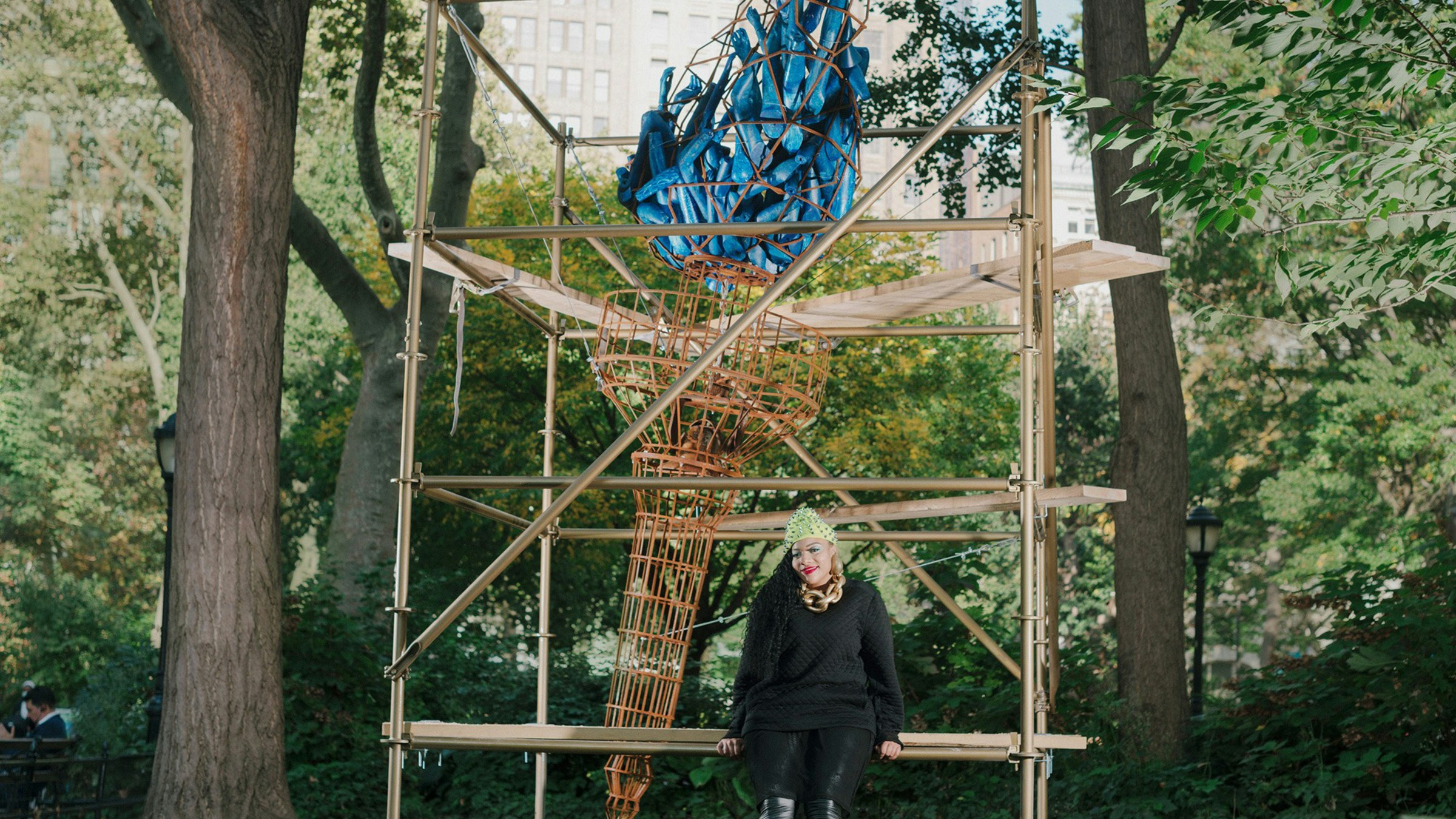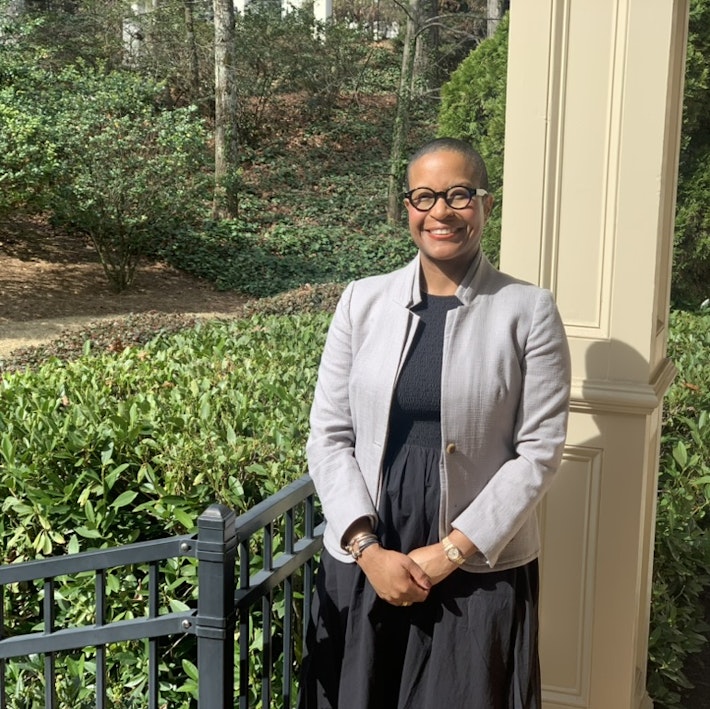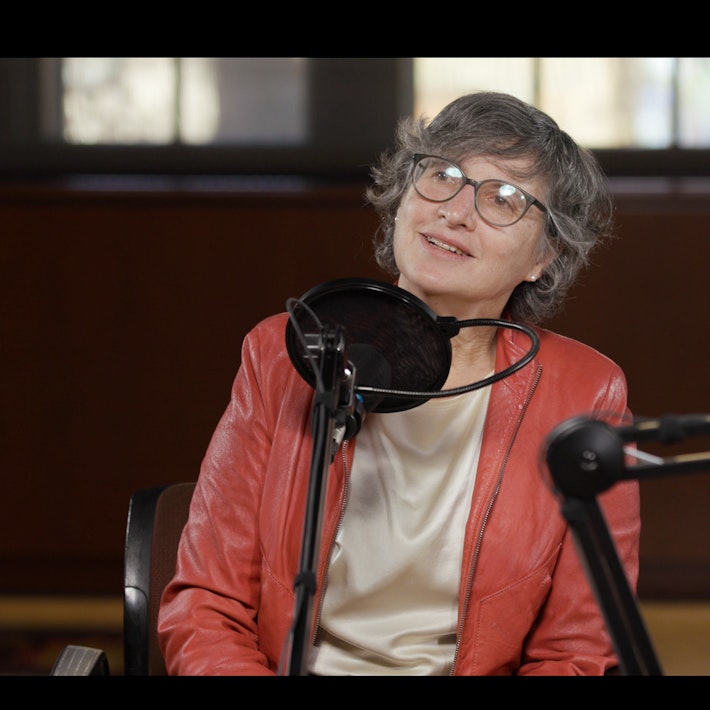Newsmakers | Fall/Winter 2021

The Newsmakers section of Radcliffe Magazine brings the extraordinary achievements of Radcliffe alumnae, faculty, and fellows to our readership. Please tell us about your awards, publications, and other accomplishments by e-mailing magazine@radcliffe.harvard.edu.
The Modern Language Association of America named Robin Bernstein RI '19 a cowinner 58th annual William Riley Parker Prize for an outstanding article published in PMLA, the association’s journal of literary scholarship. Bernstein, the Dillon Professor of American History and a professor of African and African American studies and of studies of women, gender, and sexuality in the Harvard Faculty of Arts and Sciences, finished the prize-winning “‘You Do It!’: Going-to-Bed Books and the Scripts of Children’s Literature” during her fellowship year.
The 2021 National Book Award for nonfiction was awarded to All That She Carried: The Journey of Ashley’s Sack, a Black Family Keepsake (Random House, 2021), by Tiya Miles ’92, RI ’22, who is a Radcliffe Alumnae Professor at Harvard Radcliffe Institute, a professor of history in the Harvard Faculty of Arts and Sciences, and a member of the Presidential Committee on Harvard and the Legacy of Slavery, a University-wide effort anchored at Harvard Radcliffe Institute. (Read the Radcliffe Magazine review of the book.) Among the National Book Award finalists were Matrix (Riverhead Books, 2021), by Lauren Groff RI ’19, in fiction; Running Out: In Search of Water on the High Plains (Princeton University Press, 2021), by Lucas Bessire RI ’19, in nonfiction; and The Sunflower Cast a Spell to Save Us from the Void (Nightboat Books, 2021), by Jackie Wang AM ’19, PhD ’20, RIGF ’20, in poetry. The longlist also included The Souvenir Museum (Ecco, 2021), by Elizabeth McCracken RI ’09, in the fiction category.
The 2021 Joseph Fletcher Prize for Best Edited Book in Historical International Relations was awarded to Women’s International Thought: A New History (Cambridge University Press, 2021), edited by Patricia Owens RI ’13 and Katharina Rietzler. They worked on the book at Radcliffe during Owens’s fellowship.
Nancy Rose ’80, RI ’22, the Matina S. Horner Distinguished Visiting Professor at Radcliffe and Charles P. Kindleberger Professor of Applied Economics at the Massachusetts Institute of Technology, received this year’s Carolyn Shaw Bell Award in recognition of her contributions to advancing the status of women in economics.
The poet, legal scholar, and prison reform advocate Reginald Dwayne Betts RI ’12 and the historian of race and anti-racism activist Ibram X. Kendi RI ’21 were among the 2021 MacArthur Fellows.
Several Radcliffe-affiliated historians were appointed to the Organization of American Historians (OAH) Distinguished Lectureship Program in 2021: Ashley D. Farmer AM ’08, PhD ’13, RI ’20, Corinne T. Field RI ’19, Tanisha C. Ford RI ’19, Liette Gidlow BI ’00, RI ’20, and Lydia R. Otero ’92.
Jill Lepore BI ’00, RI ’20, David Woods Kemper '41 Professor of American History, Harvard College Professor, and an affiliate professor of law, and Durba Mitra RI ’19, Carol K. Pforzheimer Assistant Professor at Radcliffe and assistant professor of studies of women, gender and sexuality at Harvard, received 2021 Walter Channing Cabot Fellowships.
Anthony Abraham Jack AM ’11, PhD ’16, RI ’22, was named a cowinner of the 2021 Doris Entwisle Early Career Award from the American Sociological Association’s Sociology of Education section. Jack is a Shutzer Assistant Professor at Harvard Radcliffe Institute, a junior fellow at the Harvard Society of Fellows, and an assistant professor of education at the Harvard Graduate School of Education.
Thea Riofrancos RI ’21 received the 2021 Charles Taylor Book Award for Resource Radicals: From Petro-Nationalism to Post-Extractivism in Ecuador (Duke University Press, 2020).

Tiya Miles accepts the 2021 National Book Award in Nonfiction from her home during a stream of the virtual event.
In “Health Risks of Space Tourism: Is It Responsible to Send Humans to Mars?”—an opinion piece that appeared in The Hill—Merav Opher RI ’22 and Avi Loeb argue that more research into the effect of cosmic radiation on humans is necessary before launching civilians into space for extended periods of time.
The New York Times Book Review released “100 Notable Books of 2021,” included Libertie (Algonquin, 2021), by Kaitlyn Greenidge RI ’19; How to Slowly Kill Yourself and Others in America (Scribner, 2021), by Kiese Laymon RI ’21; On Juneteenth (Liveright, 2021), by Annette Gordon-Reed JD ’84, Ri ’12, RI ’13, RI ’14, RI ’16; and People Love Dead Jews: Reports from a Haunted Present (W. W. Norton, 2021), by Dara Horn ’99, PhD ’06. Also on the list were America on Fire: The Untold History of Police Violence and Black Rebellion since the 1960s (Liveright, 2021), reviewed in our last issue, by Elizabeth Hinton; The Family Roe: An American Story (W. W. Norton, 2021), researched at our Schlesinger Library, by Joshua Prager NF ’11; and How the Word Is Passed: A Reckoning with the History of Slavery across America (Little, Brown, 2021), by Clint Smith III EdM ’17, PhD ’20, who gave a summer virtual book talk at Radcliffe.
In the Atlantic article “Can 3.5 Percent Save the Planet?” Erica Chenoweth RI ’22, a Susan S. and Kenneth L. Wallach Professor at Radcliffe and the Frank Stanton Professor of the First Amendment at Harvard Kennedy School, argues that a small increase in support for environmental causes could make a significant impact: “If 3.5 percent of a country’s—or the world’s—population backs any one issue or policy proposal, that is a substantial enough voting bloc, consumer market, and workforce to get those in power to pay attention.”
A New York Times review of the anthology Now Comes Good Sailing: Writers Reflect on Henry David Thoreau (Princeton University Press, 2021), titled “Why Does Thoreau Live On? A Few Famous Writers Offer Answers.” called out essays by Lauren Groff RI ’19 and Megan Marshall ’77, RI ’07, who were among the 27 “iconic writers” to contribute. “The most beautiful essay here is also the most bittersweet: a Thoreauvian elegy written by Megan Marshall entitled ‘Without,’” wrote the reviewer John Kaag.
In “To Reduce Inequality on College Campuses, Invest in Relationships,” which appeared in Inside Higher Ed, Becca Spindel Bassett PhD ’22, RIGF ’22 argues that institutions of higher education have a responsibility to provide valuable resources and supportive relationships.
“DNA Reveals Surprise Ancestry of Mysterious Chinese Mummies,” which appeared in Nature, discussed recently published research by Christina Warinner AM ’08, PhD ’10, the Sally Starling Seaver Associate Professor at Harvard Radcliffe Institute and associate professor of anthropology in the Harvard Faculty of Arts and Sciences. The research concerns the origins of hundreds of naturally preserved mummies found in China’s Tarim Basin, which have been a mystery to archaeologists since their discovery.
For about the past year, Reginald Dwayne Betts RI ’12 has been selecting poetry for the New York Times Sunday Magazine, and there have recently been a few poems by Radcliffe affiliates among his selections—namely “We Feel Now a Largeness Coming On,” by Tracy K. Smith ’94, who is a Susan S. and Kenneth L. Wallach Professor at Radcliffe and a professor of English and of African and African American Studies in the Harvard Faculty of Arts and Sciences; “I came to you,” by Jean Valentine ’56, BI ’68, whose papers are housed in our Schlesinger Library; and “Children Listen,” by Roger Reeves RI ’22.
After a 2019 Radcliffe exploratory seminar, Michael Bronstein RI ’18, Shafi Goldwasser RI ’18, and David Gruber RI ’18, formed Project CETI (Cetacean Translation Initiative) with the mission to study communication among highly intelligent sperm whales to understand the species on a new level. Hakai Magazine presented the research in “Are We on the Verge of Chatting with Whales?”
Upon his arrival in Cambridge for his fellowship, W. Ralph Eubanks RI ’22 began mentally comparing the Civil War monuments he encountered in the area to those on display in the South. He wrote about what he noticed for the New Yorker, in an essay titled “How Cities in the American North Can Reckon with Their Monuments.” Earlier, America published “Why Has Mississippi Inspired So Many Great Writers?,” an excerpt from Eubanks’s A Place Like Mississippi (Timber Press, 2021), which discusses why Mississippi has inspired writers like Eudora Welty, William Faulkner, Natasha Trethewey, and more.
In “The Untold Story of the Portuguese Diplomat Who Saved Thousands from the Nazis,” Chanan Tigay RI ’20 writes about Aristides de Sousa Mendes, who as consul general in Bordeaux, France, issued visas to any refugees who asked for them at the outset of World War II. The article appeared in the November issue of Smithsonian Magazine.
Roger Reeves RI ’22 published the poem “Standing in the Atlantic” in the October 18 issue of the New Yorker.
In “Past Pandemics Remind Us COVID Will be an Era, Not a Crisis That Fades,” in the New York Times, Allan M. Brandt RI ’20 weighed in on the future of COVID-19 and its impact. “We tend to think of pandemics and epidemics as episodic,” he said. “But we are living in the COVID-19 era, not the COVID-19 crisis.” Brandt is the Amalie Moses Kass Professor of the History of Medicine in Harvard Medical School’s Department of Social Medicine.
In a Boston Globe interview titled “Tiya Miles Writes History but She Reads Everything,” the Radcliffe Alumnae Professor at Radcliffe and professor of history in the Harvard Faculty of Arts and Sciences discussed her favorite literary genres, what she’s reading now, and the work that inspired her to become a historian.
Tracy K. Smith ’94, Susan S. and Kenneth L. Wallach Professor at Harvard Radcliffe Institute and professor of English and of African and African American Studies in the Harvard Faculty of Arts and Sciences, reviewed Bewilderment (W.W. Norton, 2021) in the New York Times article “In Richard Powers’s New Novel, Hope for a Grieving Kid and Planet May Lurk in the Human Brain.”
People’s World reviewed the latest book by Amelia M. Glaser RI ’22 in “Songs in Dark Times: Yiddish Poets Engage Mid-20th Century Crises and Traumas.”
The New York Times profiled Maria Tatar BI ’78, RI ’07 in “What about the Heroine’s Journey?” Tatar is the John L. Loeb Research Professor of Germanic Languages and Literatures and of Folklore and Mythology, Emerita, in the Harvard Faculty of Arts and Sciences and a senior fellow of the Harvard Society of Fellows.
In the Washington Post article “Virginia Wants to Prevent Gerrymandering: Can a Mathematician Help?” Moon Duchin ’97, RI ’19 explained how she plans to help the state of Virginia with its redistricting process using data science. Duchin is an associate professor of mathematics and a Tisch College Senior Fellow at Tufts University.
Dance Magazine profiled Grisha Coleman RI ’22 in the article “From Urban Bush Women to Robots: Meet Grisha Coleman.” In addition to being a dancer and choreographer, Coleman is an an associate professorship of movement, computation and digital media at Arizona State University.
In a New York Review of Books article titled “The Color Line,” Annette Gordon-Reed JD ’84, RI ’12, RI ’13, RI ’14, RI ’16 reviews a trio of books: W.E.B. Du Bois’s Data Portraits: Visualizing Black America: The Color Line at the Turn of the Twentieth Century (W.E.B. Du Bois Center at the University of Massachusetts Amherst/Princeton Architectural Press,), edited by Whitney Battle-Baptiste and Britt Rusert; Black Lives 1900: W.E.B. Du Bois at the Paris Exposition, edited by Julian Rothenstein, with an introduction by Jacqueline Francis and Stephen G. Hall (Redstone,); and A History of Data Visualization and Graphic Communication (Harvard University Press, 2021), by Michael Friendly and Howard Wainer.
In Slate, Anne Higonnet ’80, RI ’20 wrote about an iconic Nirvana album cover: “Now, the cover of Nevermind looks genuinely different,” she said in “Swimming through Time,” which analyzes the cover image in light of issues brought up by a recent lawsuit.
In “Black Colleges, from the Start, Were Given Less and Expected to Do More,” which appeared in the New York Times Book Review, Anthony Abraham Jack AM ’11, PhD ’16, RI ’22 reviews Adam Harris’s book The State Must Provide: Why America’s Colleges Have Always Been Unequal—and How to Set Them Right (Ecco, 2021).
Viet Thanh Nguyen RI ’09 opined on the end of the war with Afghanistan in “I Can’t Forget the Lessons of Vietnam. Neither Should You.” and counseled young artists on how to best to let down their parents in “Advice for Artists Whose Parents Want Them to Be Engineers.” Both articles appeared in the New York Times.
The journalist Miriam Pawel ’79, RI ’21 first began reporting on the Cuomos as a 20-something Albany bureau chief for Newsday. In “This Is How a Political Dynasty Bites the Dust,” which appeared in the New York Times, she offered her perspective on Andrew Cuomo’s resignation as governor of New York State.
The Brilliant, a STEM news website, profiled Hala Zreiqat RI ’17 in “The Brilliant Mind behind 3D-Printable Synthetic Bone Implants.”
The sociologist Elizabeth Chiarello RI ’20 and the historian of medicine Allan M. Brandt RI ’20 published an opinion piece about the coming opioid settlements in USA Today. “These funds cannot compensate for our tragic collective loss, but they can be used to help those who are suffering,” they wrote in “Opioid Settlements Are Imminent. Spend the Money on Proven Treatments That Save Lives.“ They also share which programs could be most beneficial.
Daniel Carpenter RI ’08, Radcliffe’s faculty director of the social sciences and the Allie S. Freed professor of government at Harvard, wrote about the Alzheimer's drug Aduhelm in the wake of its approval in the Washington Post article “We’re Seeing What Happens When the FDA Loses Credibility.” Carpenter is the author of Reputation and Power: Organizational Image and Pharmaceutical Regulation at the FDA (Princeton University Press, 2010).
“A pandemic can’t keep a good hostess down,” said the Boston Globe about Trisha Pérez Kennealy ’92, MBA ’97 in the article “In Lexington, a Modern Take on Historic Hospitality.” Kennealy owns the Inn at Hastings Park in the Boston western suburb, and she is a Dean’s Advisory Council member.
In his New York Times guest essay “How Should We Do Drugs Now?” Michael Pollan RI ’16 considered the decriminalization of certain drugs with therapeutic value. The newspaper previously featured a Q and A with the writer about his reading habits, “After a Hard Day’s Writing, Michael Pollan Likes to Unwind with a Novel.”
In “The Truth Teller of the Supreme Court,” which appeared in the New York Times, Linda Greenhouse ’68 shared some opinions of her own about Sonia Sotomayor, saying, “After 12 years on the court, Justice Sotomayor has entered cultural icon territory, reminiscent of the status Justice Ruth Bader Ginsburg achieved before her death last September.”
Jana Prikryl RI ’18 published a poem, “The Theater,” in the Atlantic. Her most recent collection is No Matter (Tim Duggan Books, 2019).

Mutiny, a poetry collection by Phillip B. Williams, is one of the many titles recently published by Radcliffe affiliates.
Tuna Şare Ağtürk RI ’19 has published The Painted Tetrarchic Reliefs of Nicomedia: Uncovering the Colourful Life of Diocletian’s Forgotten Capital (Brepols, 2021). She worked on the book while she was the Hilles Bush Fellow at Radcliffe.
The latest contribution to the study of myth and folklore from Maria Tatar AM ’79, BI ’78, RI ’07 is The Heroine With 1,001 Faces (Liveright, 2021). “The Heroine With 1001 Faces is not exactly a rebuttal to Joseph Campbell’s 1949 classic, The Hero With a Thousand Faces—but it is a counter-book,” says a review in the Atlantic.
A book has emerged from the accelerator workshop that Carol Oja RI ’17, now faculty director of the Radcliffe humanities program, co-organized with Charles Hiroshi Garrett in May 2017. Sounding Together: Collaborative Perspectives on U.S. Music in the 21st Century (University of Michigan Press, 2021) is both a published volume and an open-access book, and Cheryl Townsend Gilkes WSRPF ’82, BI ’83, Kay Kaufman Shelemay RI ’08, Braxton D. Shelley RI ’20, and Rachel Wheeler ’73, MD ‘77 are among the contributors.
Joan Naviyuk Kane ’00, RI ’20 has published Dark Traffic (University of Pittsburgh Press, 2021). She worked on the poems during her Radcliffe fellowship. Read a Q and A with the author.
Matrix (Riverhead Books, 2021), by Lauren Groff RI ’19, is now in bookshops. It was inspired by a talk given by her fellowship colleague Katie Bugyis RI ’19. Read the Radcliffe Magazine review of the novel.
Philip B. Williams RI ’21 worked on his latest collection, Mutiny (Penguin Books, 2021), during his fellowship year. “With punchy lines and formal play, the poems here make equal room for rage and tenderness,” said the New York Times in a roundup of poetry collections.
A group of Radcliffe Research Partners helped James Sturm RI ’21 with the research and writing of Health and Wealth (Center for Cartoon Studies, 2021), which is available for free download. Read the Radcliffe Magazine review of the comic.
Jennifer C. Nash ’01, JD ’04, PhD ’09, RI ’20 has published Birthing Black Mothers (Duke University Press, 2021), which Ms. called an “essential examination of Black motherhood and its layered complexities of representation, performance, gaze, critique, precarity and politics.” She published an associated article, The Real Reason Black Mothers Are Pushed to Breastfeed” in The Cut. Nash worked on the book during her Radcliffe fellowship.
The Church of the Dead: The Epidemic of 1576 and the Birth of Christianity in the Americas (New York University Press, 2021) is the latest book by Jennifer Scheper Hughes MDV ’96, RI ’17, the result of her fellowship year at the Institute. Publishers Weekly gave it a starred review, and the book is also reviewed in this issue of Radcliffe Magazine.
For the past four years, the historian Irmtrud Wojack RI ’15 and the writer and editor Ben Miller RI ’15 have collaborated to develop the nonprofit internet project Fritz M. Bauer Library of Remembrance and Human Rights. Their first publication is Full of Hunger and Full of Bread: The World of Jura Soyfer 1912-1939 (Buxus Edition, 2021), by Dorothy James, a biography of the man best known for composing “The Dachau Song” while imprisoned in that concentration camp. Volumes two and three in the series—Amineh—“No Bigger Than a Kalashnikov”: A Peshmerga in Parliament (Buxus Edition, 2021), by Amineh Kakabaveh and Johan Ohlson, and To Live, to Fight, and to Be Ourselves (Buxus Edition, 2021), by Gabriela Brimmer und Elena Poniatowska—are slated to follow this month.
In This Is Your Mind on Plants (Penguin Press, 2021), Michael Pollan RI ’16 continues his exploration of mind-altering substances. “Expert storytelling,” said the New York Times Book Review. “[Pollan] masterfully elevates a series of big questions about drugs, plants, and humans that are likely to leave readers thinking in new ways.”
Daniel Carpenter RI ’08 has published Democracy by Petition: Popular Politics in Transformation, 1790–1870 (Harvard University Press, 2021). Carpenter is the faculty director of the social sciences at Harvard Radcliffe Institute and the Allie S. Freed Professor of Government in the Harvard Faculty of Arts and Sciences.
Audiobook enthusiasts will be interested in the novella I, AutoHouse (Audible, 2021), by Gish Jen ’77, BI ’87, RI ’02—a sequel to her recent novel The Resisters (Knopf, 2020).
Ladee Hubbard RI ’22 published her second novel, The Rib King (Amistad, 2021). “Hubbard delivers a dazzling tour-de-force in this richly painted, perfectly timed meditation on privilege and fury,” said Booklist in a starred review.
The science writer Dale Peterson RI ’14 gathered a variety of writings from across history and around the world for Thirty-Three Ways of Looking at an Elephant (Trinity University Press, 2020), which Publishers Weekly said “will strike a chord with readers fascinated by the mysteries of the animal kingdom, and by humans’ commonality with other species.”
Anna Maria Hong RI ’11 has published a hybrid poetry collection titled Fablesque (Tupelo Press, 2020), which blends personal essay, prose poem, and verse. “It’s difficult to leave this book alone,” said an in-depth review in Heavy Feather Review. “Even a first reading foments rebellion in the rest of our hours: we need to return to it, to bask, to learn.”
In Freddie’s Last Ride: What Really Happened to Freddie Gray (Dorrance Publishing, 2020), Mary Anne Whelan ’61, AM ’69, PhD ’72 uses her medical expertise to examine the death of the Baltimore man who died under police custody in 2015 and the trial that followed.
Edward Ball RI ’17 has published his “micro-history” Life of a Klansman: A Family History in White Supremacy (Farrar, Straus and Giroux, 2020), written in part during his fellowship. The book—which Kirkus Reviews called “an illuminating contribution to the literature of race and racism in America”—tells the story of Polycarp Constant Lecorgne, a Civil War–era white Creole carpenter from New Orleans—and Ball’s great-great-grandfather.
Jenny Davidson ’92, a professor of English and comparative literature at Columbia University, made a startling discovery after her grandmother’s death: an unpublished novel written in the 1950s. Struck by its prescience, Davidson set to editing it, and now—nearly 70 years after Margaret Brown Kilik penned it—The Duchess of Angus (Trinity University Press, 2020) has been published. “This is a live piece of writing, a novel not just of historical interest but of significant literary power and force in its own right,” writes Davidson in her introduction.
Lost and Found Departments (Cornerstone Press, 2020) is the latest poetry collection by Heather Dubrow ’66, PhD ’72, BI ’88. Kenyon Review published a Q and A with the author, who is the John D. Boyd, SJ, Chair in Poetic Imagination at Fordham University and the author of Forms and Hollows (Cherry Grove Collections, 2010) and two chapbooks.
Wendy Lesser ’73 explores the culture of Denmark, Norway, and Sweden through the region’s crime fiction in Scandinavian Noir: In Pursuit of a Mystery (Farrar, Straus and Giroux, 2020). “Lesser isn’t here to win converts, but even those unmoved by its subject will thrill to the book, a beautifully crafted inquiry into fiction, reality, crime and place,” said a New York Times review. The Paris Review published an excerpt, “The Origins of Scandinavian Noir.”
These Fevered Days: Ten Pivotal Moments in the Making of Emily Dickinson (W. W. Norton, 2020) is the latest book by Martha Ackmann RI ’09. Said a New Yorker Review, “The Emily Dickinson who emerges in this vivid, affectionate chronicle is a complex and warm-blooded individual—as curious, defiant of convention, and passionate in life as in her poems.”
In Unfinished History: Notes of a Chronic Re-reader (Farrar, Straus & Guroux, 2020), Vivian Gornick RI ’08 revisits the books that shaped her. In a starred review, Library Journal called it “a delightful entry for lovers of literature and literary criticism.”
Traces of J. B. Jackson: The Man Who Taught Us to See Everyday America (University of Virginia Press, 2020), by Helen Lefkowitz Horowitz AM ’65, PhD ’69, RI ’01, is the first major biography of a giant of landscape studies whom the New York Times once called “America’s greatest living writer on the forces that have shaped the land this nation occupies.” An SCA Roadside review called the book “a warts-and-all portrait” and “a piercingly intelligent chronology that follows Jackson year by year and sometimes week by week.”
Cynthia Mitchell ’73, a psychologist and psychoanalyst, has published her first novel, Hand Me the River (Draft2Digital, 2019), described by readers as “an insightful and heart-wrenching experience of love, loss and all that life does and does not deliver” and “a seemingly simple book that packs a powerful psychological and emotional punch.” Mitchell’s short stories appear in Per Contra literary magazine.
Note: This section contains books published in 2020 about which we didn’t learn until our offices reopened following the COVID lockdown. We regret the delayed acknowledgement.

A still from Matias Piñeiro's film Isabella.
Maria Tatar AM ’79, BI ’78, RI ’07, an expert on folklore and children’s literature who is the John L. Loeb Professor of Germanic Languages and Literatures and chair of the Committee on Degrees in Folklore and Mythology at Harvard, appeared in the “Fairy Tales” episode of the Netflix show Explained, which explored the history and significance of these stories.
This fall, the tap dancer Ayodele Casel RI ’20 brought her show Chasing Magic to the stage for the first time. After debuting as a virtual event at New York’s Joyce Theater during the city’s COVID lockdown, the show enjoyed a live, two-week run at the American Repertory Theater.
The latest film from Matías Piñeiro RI ’12—which, titled Isabella, is in part inspired by Shakespeare’s Measure for Measure—recently enjoyed a run at select theaters. It was a New York Times Critic’s Pick.
Barbara Swan BI ’63—a painter who was featured alongside Maxine Kumin ’46, AM ’48, BI ’63, Tillie Olsen BI ’63, Marianna Pineda BI ’63, and Anne Sexton BI ’63 in the Maggie Doherty PhD ’15 book The Equivalents: A Story of Art, Female Friendship, and Liberation in the 1960s (Knopf, 2020)—was the subject of an episode of the Cape Ann–centered artist documentary series The Color of Light.
John Alba Cutler RI ’21, an associate professor of English at the University of California, Berkeley, appeared on Jeopardy on June 2—and was crowned champion on that day.
The composer and conductor David Sanford RI ’14—who is also the Elizabeth T. Kennan Professor of Music at Mount Holyoke College—has released a new album, titled A Prayer for Lester Bowie (Greenleaf, 2021), under the name David Sanford Big Band. “Sanford’s work often has door-blasting power,” said the critic Seth Colter Walls in “David Sanford’s Music Has Flown Under the Radar. It Shouldn’t.” which appeared in the New York Times. “Yet whether he’s writing for a chamber ensemble, a big band or an orchestra, his wildness never tips into indiscipline.” In a more lighthearted article for JazzTimes, “Artist’s Choice: David Sanford Names His Favorite Roller Coasters,” Sanford shares his five favorite amusement-park rides.
Opera News reviewed Heart Chamber, on which Chaya Czernowin RI ’20 worked during her fellowship year.

Amanda Castro, Ayodele Casel, and Kurt Csolak in Ayodele Casel: Chasing Magic, which played at the American Repertory Theater. Photo by Liza Voll
Light of Freedom, a public artwork by Abigail DeVille RI ’15, most recently on view in Madison Square Park, has found a new home at the Smithsonian’s Hirshhorn Museum and Sculpture Garden. The 13-foot-tall mixed-media installation is DeVille’s response to the Black Lives Matter movement. Sitting in the museum’s outdoor Sculpture Garden on the National Mall facing the US Capitol building, Light of Freedom critiques an uneven application of liberty. It's on view until April 22. (See DeVille with her installation at the top of this page.)
Anne Seelbach BI ’90 exhibited work this past summer on Nantucket as part of a Keyes Gallery pop-up exhibition and in Southampton, New York, as part of the group exhibition eARTh: Artists as Activists at the Southampton Arts Center.
Michael Bronstein RI ’18 has been appointed as DeepMind Professor of Artificial Intelligence at the University of Oxford’s Department of Computer Science. He begins his post in January, and he will also serve as a fellow of Exeter College. Bronstein joins from Imperial College London.
Jonathan Guyer RI ’18 will join Vox on December 13 as the network’s senior foreign policy writer. The widely published journalist, whose work has won a Hillman Prize, most recently was the managing editor of the American Prospect.
The filmmaker Abigail Child ’68, RI ’06 recently delivered the 11th annual Experimental Lecture at New York University’s Tisch School of the Arts. “Where Is Your Rupture,” in which Child explored her body of work, took its title from an Andy Warhol painting.
Cynthia Dwork RI ’18, RI ’19, RI ’21 delivered the lecture “What Are Your Chances? The Defining Problem of AI” at the Alan Turing Institute in September. Dwork, who is an expert in cryptography, is a Radcliffe Alumnae Professor and the Gordon McKay Professor of Computer Science at the Harvard John A. Paulson School of Engineering and Applied Sciences.
The novelist Kaitlyn Greenidge RI ’19—whose most recent book, Libertie (HarperCollins, 2021), was written in part at Radcliffe—appeared on the podcast Book Dreams, in an episode titled “When It’s Exceptional to Be Unexceptional.”
Earlier this fall, Susan A. Murphy RI ’20 delivered the 2021 Myles Hollander Distinguished Lecture at Florida State University, video of which is available online. Murphy is a Radcliffe Alumnae Professor at Harvard Radcliffe Institute and professor of statistics and of computer science at Harvard John A. Paulson School of Engineering and Applied Sciences.
Margaret Morganroth Gullette ’62, PhD ’75, BI ’87 appeared on the CBC podcast Ideas with Nahlah Ayed, in an episode titled “Common Good: The Value of Old Age,” which the CBC revisited in an article “‘Fear Ageism, Not Aging’: How an Ageist Society Is Failing Its Elders.” She is a resident scholar in Women's Studies Research Center at Brandeis University and the author Ending Ageism, or How Not to Shoot Old People (Rutgers University Press, 2017).
Panče Naumov RI ’19, a professor of chemistry at New York University Abu Dhabi, has been appointed a member of Angewandte Chemie’s International Advisory Board, which serves as an intermediary between the journal’s editorial team and the scientific community.
Jackie Wang AM ’19, PhD ’20, RIGF ’20 was appointed an assistant professor of American studies and ethnicity at the University of Southern California.
Angie Bautista-Chavez AM ’20, PhD ’20, RIGF ’20 accepted Arizona State University’s offer to join the School of Politics and Global Studies and the Center for Latina/os and American Politics Research. She joined as a postdoc and began as an assistant professor in September.







